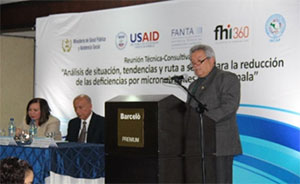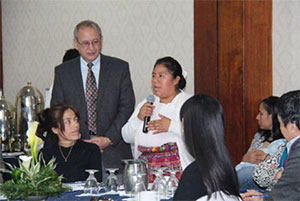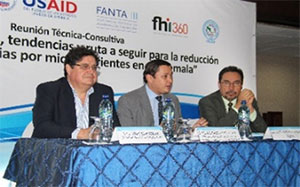Technical Consultation Held on February 25–26, 2016

Vice-Minister of the Ministry of Health, Dr. Rodolfo Zea, opened the meeting with the assistance of Dr. Baudilio López, Health Officer, USAID/Guatemala, and Carolina Siu, Director, INCAP.
Given the extent of micronutrient deficiencies in Guatemala, the changing nature of micronutrient deficiencies as demonstrated through national surveys over the past decade, and the priority that the incoming elected Government has placed on the reduction of chronic malnutrition, a technical consultation was held on Feb. 25–26, 2016 to review the situation of micronutrient nutrition and discuss strategies to move forward. By the end of the meeting, representatives from the Ministry of Health committed to next steps. These include incorporating new guidelines and a plan of action that will be developed after the meeting into the national strategy to reduce chronic malnutrition.
The meeting was opened by Vice Minister of Primary Health Care, Dr. Rodolfo Zea Flores, from the Guatemala Ministry of Health (Ministerio de Salud Pública y Asistencia Social or MSPAS). He remarked that although Guatemala has seen great achievements in reducing some micronutrient deficiencies through supplementation programs and successful public-private alliances to fortify foods, challenges still exist. More work is needed to improve dietary diversity, intake of micronutrient supplements, access to fortified complementary foods, and nutrition surveillance to monitor programs and their impacts to effectively decrease and control micronutrient deficiencies and chronic malnutrition.

Participants included representatives from civil society organizations, such as Rosario López with Red ALIANMISAR (a national alliance of indigenous women for reproductive health, nutrition, and education.)
Following the opening, several presentations were given that focused on strategies to improve micronutrient intake among Guatemalan populations:
- National experts from MSPAS, the National Commission for Fortification, Enrichment, and/or Food Equity/INCAP, and FAO presented on programs and interventions that are being carried out to reduce micronutrient malnutrition in Guatemala. The presentation highlighted achievements, lessons learned, and current challenges particularly related to supplementation with micronutrients, food fortification, and food-based approaches.
- Dr. Omar Dary, Senior Nutrition Advisor, Bureau for Global Health, USAID, shared insights and guidance on considerations, advances, and challenges for effective and efficient micronutrient programs.
- Monica Woldt, Technical Advisor, Maternal and Child Health and Nutrition, FANTA/FHI 360 presented on Optifood, a linear programming tool for development of food-based recommendations to improve micronutrient intake of targeted populations.
- Dr. Lindsay Allen, Center Director of the USDA, ARS Western Human Nutrition Research Center, shared recent findings on vitamin B12 deficiency in women and children, its implications, and possible options to improve vitamin B12 status relevant to Guatemala.
- Dr. Rafael Flores-Ayala, Team Lead of the International Micronutrient Malnutrition Prevention and Control Program at CDC, presented on the development of the health and nutrition epidemiological surveillance system in Guatemala and lessons learned in the process of its development. He recommended its use by the government to monitor micronutrient status and inform decision-making to prevent and control micronutrient deficiencies.
- Dr. Ruben Grajeda, Regional Technical Advisor in Nutrition for PAHO/WHO, facilitated an experts’ technical session and highlighted the need to strengthen service delivery to move forward and achieve reductions in key micronutrient deficiencies that are public health problems.
- Working groups focused on the topics of (1) micronutrient supplementation systems for women and for young children, (2) food fortification, (3) food-based approaches, and (4) monitoring and surveillance systems.The groups were asked to address key considerations and strategies to improve the micronutrient status of the Guatemalan population.

Closing ceremony with participation of Ing. Andrés Botrán, Presidential Commissioner for the Reduction of Chronic Malnutrition; Ing. German Gonzalez, Secretary of SESAN, and Dr. Luis Arturo Morales, Director, Integrated Health Care System, MSPAS.
Many key issues and recommendations were addressed during the meeting. These included the determination of priority public health problems related to micronutrients, standardization of methodologies for assessing specific micronutrient deficiencies, revision and update of norms and guidance on supplementation, considerations for addressing emerging public health micronutrient problems through food fortification, use of the surveillance system as a tool for monitoring and control of micronutrient deficiencies, improvement of maternal nutrition including dietary diversity and quality, promotion of breastfeeding, and improvement of water and sanitation.
During the closing ceremony, Dr. Luis Arturo Morales, Director of Health Services for the Integrated Health Care System of MSPAS, expressed the commitment of the Ministry of Health to lead the process and next steps that resulted from the meeting, particularly related to interventions that are the responsibility of the Ministry. Ing. Andrés Botrán, recently appointed Presidential Commissioner for the Reduction of Chronic Malnutrition, requested as a part of his closing remarks that the guidelines and plan of action that will be developed after the meeting form part of the recently launched strategy to reduce chronic malnutrition.
The consultation was held by MSPAS in collaboration with the Secretariat of Food Security and Nutrition with support by FANTA, INCAP, and PAHO/WHO, with approximately 60 participants from the Government of Guatemala, U.S. Government, United Nations, and civil society.


